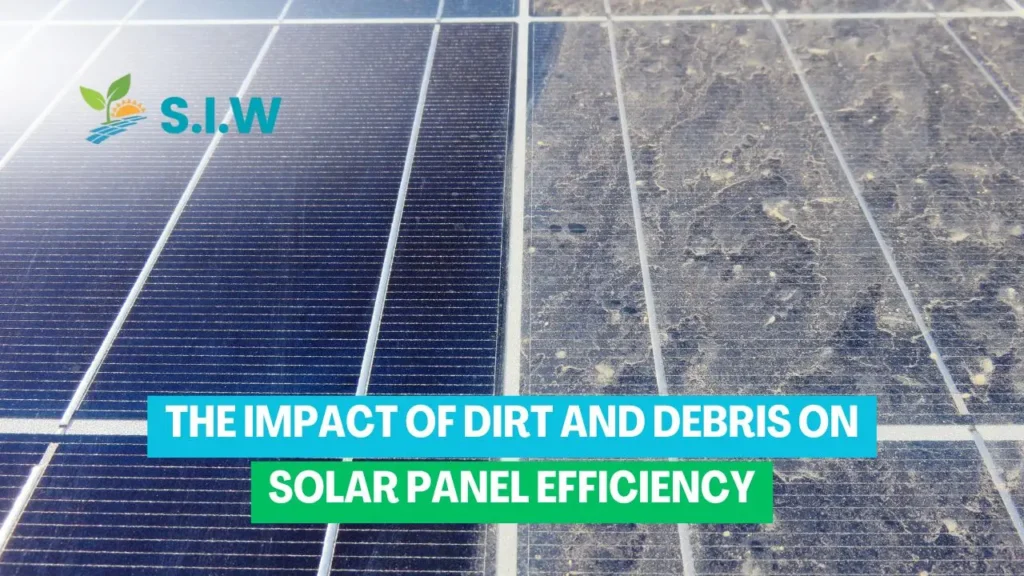Solar panels are a crucial investment for energy efficiency and sustainability. However, their performance can be significantly compromised by dirt and debris. In this comprehensive article, we delve into how these contaminants affect solar panel efficiency and offer insights into effective maintenance strategies.
How Dirt and Debris Affect Solar Panel Efficiency
- Reduced Light Absorption
Solar panels rely on unobstructed sunlight to generate electricity. Dirt, dust, and other debris can create a layer of obstruction on the panel surface, reducing the amount of sunlight that reaches the solar cells. This can lead to a noticeable decrease in energy production. Studies show that even a thin layer of dust can reduce the panel’s efficiency by up to 25%.
- Increased Surface Temperature
Accumulated debris not only blocks sunlight but also traps heat, causing the solar panel surface to become hotter. This increase in temperature can degrade the efficiency of the photovoltaic cells. Higher temperatures generally reduce the electrical output of solar panels, which can be especially problematic in regions with high ambient temperatures.
- Uneven Wear and Tear
Over time, dirt and debris can lead to uneven wear on solar panels. Parts of the panel that are frequently covered may suffer from accelerated degradation compared to areas that remain clean. This uneven wear can result in long-term damage and reduced overall lifespan of the panels.
Types of Contaminants Impacting Solar Panels
- Dust and Sand
In arid and semi-arid regions, dust and sand are common contaminants. These particles can accumulate quickly, creating a persistent layer that significantly impairs solar panel performance. Regular cleaning is essential in such environments to maintain optimal efficiency.
- Bird Droppings
Bird droppings can be particularly damaging due to their acidic nature. The acids can cause corrosion and degradation of the panel’s surface and electrical components. Additionally, the droppings can create stains that further block sunlight.
- Tree Debris
Fallen leaves, branches, and pollen from trees can accumulate on solar panels, blocking sunlight and causing organic matter buildup. This not only reduces efficiency but can also lead to mold growth, which exacerbates the problem.
Effective Maintenance Strategies
- Regular Cleaning
To ensure that solar panels operate at peak efficiency, regular cleaning is crucial. The frequency of cleaning depends on the local environment. In dusty areas, monthly cleanings may be necessary, while in less polluted areas, quarterly cleanings might suffice. Use a soft brush or a non-abrasive cloth with water to gently clean the panels.
- Professional Maintenance Services
For large installations or panels that are difficult to access, it is advisable to hire professional maintenance services. These experts use specialized equipment and techniques to thoroughly clean and inspect solar panels, ensuring that all contaminants are removed without causing damage.
- Preventive Measures
Implementing preventive measures can reduce the accumulation of dirt and debris. Installing solar panel covers or protective screens can help minimize exposure to contaminants. Additionally, strategic landscaping can reduce the amount of debris falling onto the panels.
- Monitoring Systems
Advanced monitoring systems can track the performance of solar panels in real-time. These systems can alert users to any significant drops in efficiency, which may indicate the presence of dirt or other issues. Early detection allows for timely maintenance and avoids prolonged periods of reduced performance.
Conclusion
The impact of dirt and debris on solar panel efficiency is significant and can lead to substantial losses in energy production. How bad is it if I don’t clean solar panels? Contaminants can block sunlight and reduce energy output, affecting your system’s performance and longevity. Understanding these effects, coupled with implementing effective maintenance strategies, is essential for maintaining optimal solar panel performance. Regular cleaning, professional services, and preventive measures all play crucial roles in ensuring that solar panels operate efficiently and have a long lifespan.








